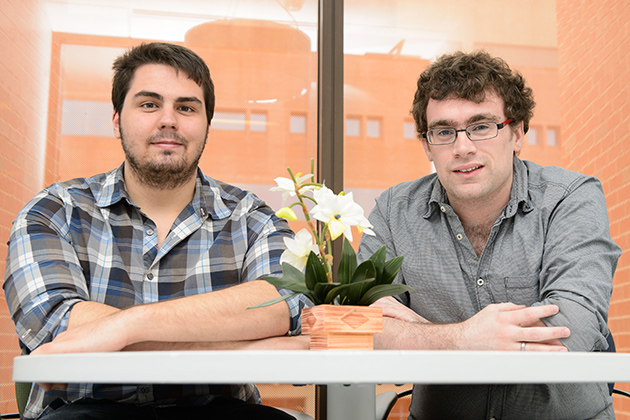
Graduate student Troy Messick of the Department of Linguistics has been selected as the 2013 Bloch Fellow of the Linguistic Society of America (LSA). The award is the most prestigious honor the national society gives to graduate students.
“It’s hard to overstate the prestige of this award,” says department head Jonathan Bobaljik. “Troy will be representing all of the graduate students in the society, nationwide.”
As the Bloch fellow, Messick, a second-year Ph.D. student working with Professor Željko Bošković, will serve on the LSA’s executive committee as a voting member and lead the student section of the society. He will also receive funding to attend the 2013 LSA Linguistic Institute, a four-week series of lectures and workshops held every two years and taught by linguistics faculty from around the world.
“At the institute, students get exposed to areas of linguistics they aren’t exposed to in their home departments,” says Bobaljik. “They get a different perspective on the topics they’re working on and have incredible opportunities to network with faculty and other students.”
A graduate of the University of Michigan, Messick studies syntax, or how sentences are constructed across languages. He says that for him, much of the draw of linguistics is its mystery.
“I see linguistics as a puzzle,” he says. “You have a set of data and you want to see generalizations in it.”
Theoretical linguists want to know what’s acceptable and unacceptable in different languages, he explains.
“We don’t wear lab coats,” he jokes, “but we do experiments and get really interesting results.”
In his work, Messick studies ellipsis, which in linguistics is the omission of words from a sentence while retaining the sentence’s original meaning. For example, in the sentence ‘John can play an instrument, but I forget which instrument he plays,’ the last part can be – and often is – dropped: ‘John can play an instrument, but I forget which.’
“When you do this, the person who’s hearing the sentence needs to be able to recover the missing words,” explains Messick. “So it has to be clear enough in the sentence, even without those words.”
Peter Smith, a third-year Ph.D. student of associate professor Susanne Wurmbrand, also received an LSA fellowship to attend the institute, to be held in June at the University of Michigan.
A graduate of University College London, Smith came to UConn to work with Wurmbrand and Bobaljik on syntax and morphology, the study of the structure of words. He studies a phenomenon that linguists used to think was impossible: taking a certain type of word, called a clitic, and inserting it in the middle of another word to change that word’s role in a sentence.
There are only a few languages in which this happens, says Smith; one example is Udi, an endangered language spoken in Azerbaijan and its surrounding Caucasus region. But he wonders if there may be more.
“The goal of linguistics is to explain the patterns we see in languages as simply as possible,” Smith says. “If we find something different in one of the 6,000 languages out there, it’s worth looking at.”


